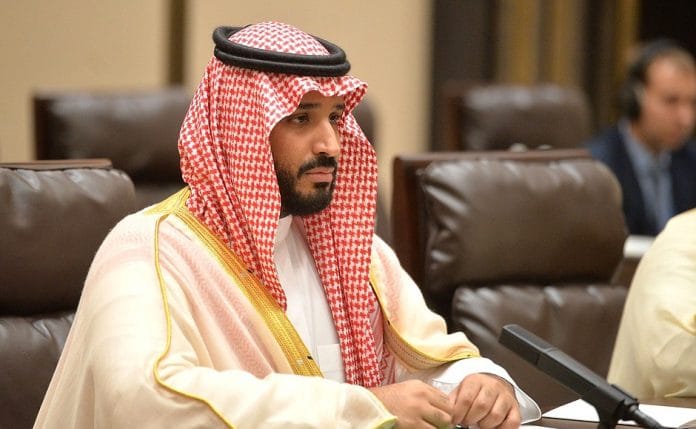New Delhi: Prime Minister Narendra Modi’s day-long visit to Saudi Arabia starting Monday night is expected to give a big boost to Saudi Crown Prince Mohammad bin Salman’s pet project, ‘Davos in the Desert’.
The ‘Davos in the Desert’, formally known as the Future Investment Initiative (FII), is an annual business conference aimed at promoting the mega investment plans of Saudi Arabia and is scheduled for October 29-31 in Riyadh this time.
Its first two editions did not take off, sources told ThePrint, prompting Saudi Arabia to scout for partners who would commit to large-scale investments in that country.
Prime Minister Modi, according to the sources, will be announcing some big-ticket investments and overseeing signing of business deals between India’s public/private sector and Saudi firms across several sectors.
The Modi government, said the sources, has asked the Indian industry to explore the possibility of investing in mega infrastructure projects in the region.
This is Modi’s second visit to Riyadh as the Prime Minister. He last visited the Kingdom in April 2016. This time, the Prime Minister is visiting the country only for 24 hours, when apart from attending the conference, he will also have a bilateral meeting with the crown prince.
Also read: The world’s oil security blanket has been torched
Pet project fails to take off
The FII has failed to bring in the desired economic investment for Saudi Arabia.
During its second edition last year, Saudi Arabia was facing international heat over the murder of US-based journalist Jamal Khashoggi.
This year, however, the event will be attended by Jared Kushner, a White House adviser and son-in-law of US President Donald Trump, Steven Mnuchin, the US Treasury Secretary, and a high-powered American business delegation.
According to T.S. Tirumurti, Secretary (Economic Relations), Ministry of External Affairs, Prime Minister Modi will be addressing the plenary of the FII, which is organised by Saudi Arabia’s sovereign wealth fund — Public Investment Fund.
“This is a pet project of Saudi Crown Prince Mohammed bin Salman and the Kingdom is now scouting for partners for supporting the FII,” said Talmiz Ahmed, veteran diplomat and former Indian Ambassador to Saudi Arabia and UAE.
“Last year, it (FII) did not meet the required objectives. The Indian government is now keen that the corporate sector also invests there in a big way, especially in the crown prince’s mega-city project that the Saudis are planning with Jordan and Egypt,” he added.
Also read: Khashoggi is Banquo’s ghost, haunting Saudi Arabia and Crown Prince Mohammed bin Salman
Strategic Partnership Council in the works
At the bilateral meeting between Prime Minister Modi and the crown prince, both sides are expected to sign a pact for a ‘Strategic Partnership Council’ that will be chaired by both.
This comes at a time when tensions between Saudi Arabia and Iran have peaked over the attacks on the Aramco oilfields for which Riyadh has blamed Tehran.
Saudi Arabia’s Minister of State Adel al-Jubeir has recently said putting “maximum pressure” on Iran is the only way to bring the Persian nation back to the negotiating table with the US, hinting at tightening of sanctions.
According to Ahmed, India should now take some “diplomatic initiative” to bring Riyadh and Tehran closer for its own benefit, because rising tensions between the two will impact the energy security of the entire region, including South Asia.
“I am not saying India should mediate. But New Delhi can give shape to a diplomatic initiative and tell both sides to bring peace in Yemen and Syria,” Ahmed added. “Tensions between Saudi and Iran were always there, but now it is impacting oil supplies. India should therefore look at promoting regional security.”
Deepening of defence, security ties
India and Saudi Arabia will be holding a joint naval exercise in December 2019 or January 2020, according to Tirumurti.
Earlier this month, Saudi Arabia’s General Authority of Military Industry delegation had visited India and met representatives of the Indian defence industry. Subsequently, representatives of Indian defence companies also visited Saudi Arabia.
“India and Saudi Arabia are looking at closer cooperation in the area of defence industries,” said Tirumurti. Both sides are also expected to make a major statement on terrorism — India would expect Saudi Arabia to speak on cross-border terrorism, considering Riyadh has close ties with Islamabad too.
This is Modi’s first visit to Riyadh after the scrapping of the special status for Jammu and Kashmir. A few weeks ago, National Security Adviser Ajit Doval was on a two-day “quiet visit” to the Kingdom to apprise the crown prince of the Kashmir situation.
Earlier this month, Pakistan Prime Minister Imran Khan had also visited Riyadh and Tehran where he discussed the Kashmir issue.
Saudi Arabia had earlier condemned the attacks in Uri and Pulwama. During the crown prince’s visit to India in February this year, he stressed on combating terrorism jointly with India.
Also read: Imran Khan wants to forge Iran-Saudi peace — goal Pakistan has failed to achieve in 48 yrs
Saudi investments in India
The crown prince had expressed his intention to invest over $100 billion in India across sectors such as energy, refining, petrochemicals, infrastructure, agriculture, minerals and mining, manufacturing, education and health.
During this trip, both sides will be finalising the west coast refinery project in Raigad district of Maharashtra, which will involve investments from Saudi’s Aramco, UAE’s ADNOC and Indian public sector oil companies. This will be the single largest greenfield refinery in India.
Also read: Saudi Arabia is committed to meeting India’s energy requirements, says ambassador to India







Ambassador Talmiz Ahmed’s suggestion that India should use its influence / good offices to reduce tensions between Sunni KSA and Shia Iran needs to be taken forward. Heightened tensions between the two, verging on war, are already hurting India. 2. Given the state of the Indian economy and the corporate sector, difficult to see India Inc making serious investments abroad for at least the next five years.